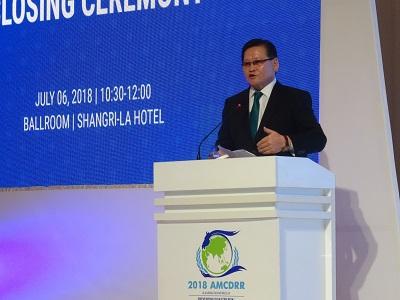
Deputy Prime Minister of Mongolia, Enkhtuvshin Ulziisaikhan, said the AMCDRR had strengthened resolve to implement the Sendai Framework.
By Denis McClean
GENEVA, 9 July, 2018 - Government ministers and civil servants from across Asia and the Pacific are back at their desks this week with a fresh mandate to accelerate action on reducing disaster losses and disaster displacement as extreme weather continues across the region.
The importance of the outcomes of the Asian Ministerial Conference on Disaster Risk Reduction (AMCDRR2018) is underlined by the evacuation of millions of people in Japan in recent days to escape flooding and landslides which have claimed over 100 lives to date.
Millions of lives will also be disrupted when Super Typhoon Maria makes landfall this week in Japan, Taiwan and China. Strong preparedness measures are in place but the disaster losses are likely to be high.
In her closing address tio the conference on Friday in the Mongolian capital, Ulaanbaatar, Mami Mizutori, the UN Special Representative for Disaster Risk reduction, said that based on the concerns raised by participants, disaster risk reduction strategies at the local level “must focus on reducing the numbers of people affected by extreme weather events, if we are to tackle the now chronic problem of forced displacement across the region.”
In 2017, an estimated 11.4 million people were displaced from their homes across the region by disaster events as concern grows that climate change is amplifying the impact of extreme weather including droughts, heat waves, wildfires, storms and floods.
The 2018 AMCDRR culminated in the Ulaanbaatar Declaration which calls on governments and other stakeholders to urgently accelerate actions to develop and implement national and local strategies for disaster risk reduction, and to commit resources and promote investment in disaster risk reduction at the local level.
The Declaration highlights the need to promote dialogue and knowledge sharing across a broad range of national and local stakeholders, including universities, the private sector, and science and technology communities.
Together with the adoption of the Ulaanbaatar Declaration, a two-year Action Plan was agreed to accelerate implementation of the Sendai Framework for Disaster Risk Reduction in Asia. The Sendai Framework is the global plan adopted by UN member states in 2015 to reduce disaster losses.